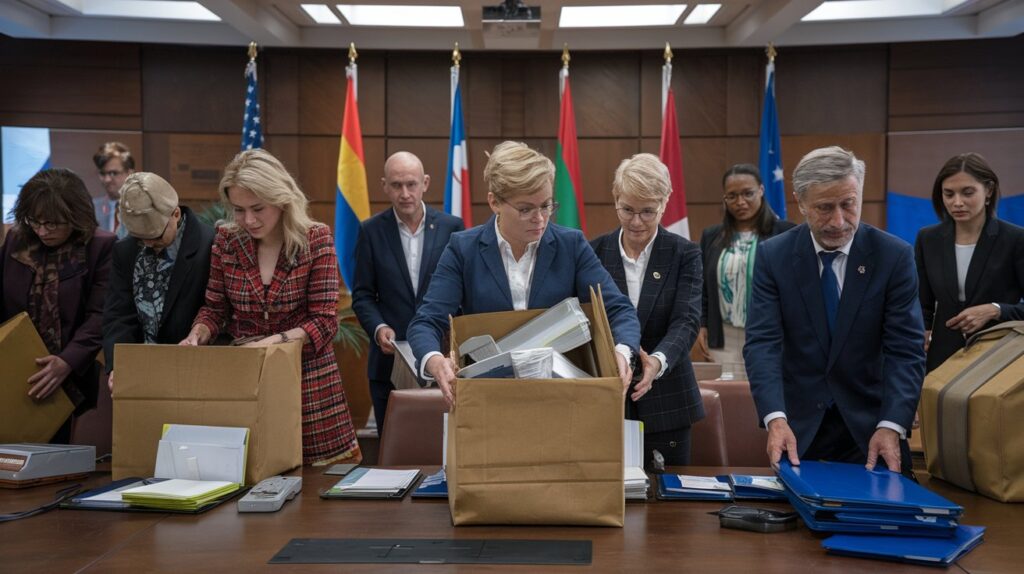State Department Terminates 60 Contractors for Democracy Projects
In a significant move that has sent ripples across the diplomatic and humanitarian landscape, the United States State Department has recently terminated the contracts of 60 contractors involved in democracy and human rights projects worldwide. This decision has raised eyebrows among analysts and advocates, who question its implications for U.S. foreign policy and the future of democracy initiatives globally.
Table of Contents
Understanding the Termination of Contracts
The abrupt termination of these contracts has been attributed to a variety of factors, with budgetary constraints and a shift in strategic priorities at the forefront. The State Department’s actions signal a potential realignment of U.S. foreign policy priorities, particularly concerning democracy promotion.
Reasons Behind the Decision
- Budget Cuts: In a climate of increasing fiscal constraints, the State Department is re-evaluating which programs receive funding.
- Strategic Reassessment: The Biden administration appears to be pivoting toward a more pragmatic approach to foreign affairs, prioritizing national security over democracy building.
- Lack of Measurable Success: Analysts have pointed out that many democracy programs have struggled to showcase tangible results, leading to questions about their effectiveness.
The Impact on Democracy Projects
The immediate consequence of this decision poses a significant threat to ongoing democracy projects in various regions, particularly in fragile democracies where external support is crucial. The terminated contractors were involved in projects that aimed to:

- Promote free and fair elections.
- Support civil society organizations.
- Strengthen legal frameworks for human rights.
The sudden withdrawal of funding and support could lead to significant setbacks for these initiatives, resulting in weakened democratic institutions and a rise in authoritarian practices in affected regions.
Global Reaction and Concerns
The international community has reacted with concern to the news of the contract terminations. Many fear that the U.S. is stepping back from its longstanding commitment to promoting democracy and human rights around the world. Key reactions include:
- Human Rights Advocates: They warn that reduced funding for democracy programs may empower authoritarian regimes.
- International Organizations: Groups like Amnesty International and Human Rights Watch have issued statements expressing apprehension about this shift.
- Scholars and Analysts: Experts argue that disengagement could leave a vacuum that may be filled by hostile powers.
The Future of U.S. Foreign Policy
This decision raises a crucial question: What does this mean for the future of U.S. foreign policy? Historically, the U.S. has positioned itself as a defender of democracy and a promoter of human rights. However, the recent trend suggests a possible retreat from these principles. Here are some potential outcomes of this shift:
- Increased Authoritarianism: Without U.S. support, authoritarian regimes may consolidate their power, resulting in broader human rights abuses.
- Isolationism: The termination of contractor support may signal a broader withdrawal from global engagements.
- Realpolitik Approach: U.S. foreign policy could pivot towards pragmatism, focusing on immediate national interests over long-term democratic commitments.
Impact on U.S. Relationships
This shift could also strain relationships with traditional allies who have supported democracy initiatives alongside the U.S. Moreover, countries that rely heavily on American backing for democratic efforts may feel abandoned, leading to:
- Tensions with Allies: Key partners may question U.S. commitment to shared democratic values.
- Increased Instability: Regions that have seen significant U.S. investment in democracy may experience increased instability without support.
- Humanitarian Concerns: Existing funding for humanitarian projects could become interlinked with democracy initiatives, putting aid at risk.
The Role of Non-Governmental Organizations
With U.S. support dwindling, non-governmental organizations (NGOs) may find themselves on the front lines of democracy promotion. NGOs will likely need to adapt their strategies to fill the void left by contractors. Some possible adaptations include:
- Innovative Approaches: NGOs might need to come up with creative funding solutions and grassroots movements to sustain democracy efforts.
- Collaboration: Building coalitions with local organizations and international bodies to pool resources and share expertise.
- Advocacy: Focusing on raising awareness and advocacy efforts may become essential to sustain momentum in democracy promotion.

Conclusion
The termination of contracts for 60 contractors signifies a pivotal moment in the landscape of U.S. foreign policy regarding democracy and human rights. With potential consequences reaching far beyond immediate projects, the long-term implications of this decision could shape international relations and the promotion of democratic values worldwide. As the international community watches closely, the onus will be on NGOs, local leaders, and citizen activists to pick up the baton in the fight for democracy, even as the U.S. reassesses its role on the world stage. [USnewsSphere.com]





